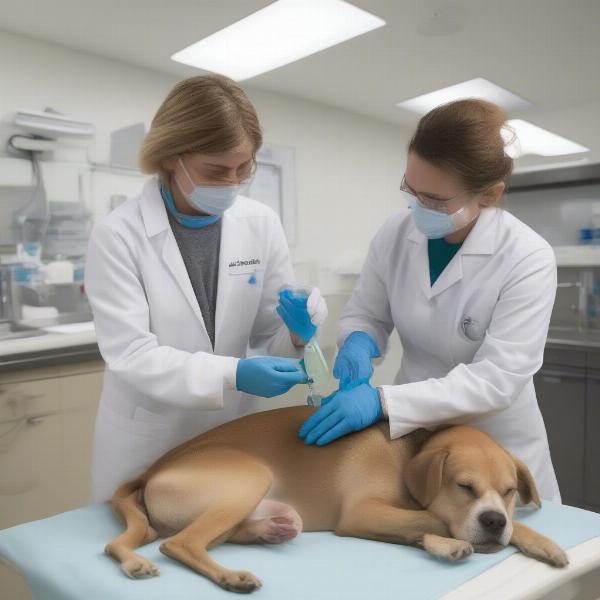Steroid responsive meningitis (SRM) in dogs, also known as idiopathic meningitis, can be a frightening diagnosis for pet owners. This article aims to provide a comprehensive overview of SRM in dogs, covering its causes, symptoms, diagnosis, treatment, and prognosis. We’ll explore what you need to know to help your canine companion navigate this challenging condition.
Understanding Steroid Responsive Meningitis in Dogs
SRM is a neurological disorder affecting the meninges, the protective membranes surrounding the brain and spinal cord. Characterized by inflammation of these membranes, SRM primarily affects young, medium to large breed dogs, although any breed can be susceptible. The “steroid responsive” part of the name refers to the condition’s positive reaction to corticosteroid treatment. While the exact cause remains unknown, it is suspected to be an immune-mediated disease, meaning the body’s immune system mistakenly attacks its own tissues.
Recognizing the Symptoms of SRM
Early diagnosis and treatment are crucial for managing SRM effectively. Be vigilant and contact your veterinarian immediately if you observe any of the following symptoms in your dog:
- Neck pain and stiffness: This is often the most noticeable sign. Your dog may be reluctant to move its head or cry out in pain when touched.
- Fever: An elevated body temperature is another common indicator.
- Lethargy and depression: Your dog may seem unusually tired and uninterested in its usual activities.
- Loss of appetite: A decrease in food intake can accompany the general malaise.
- Vomiting and nausea: These gastrointestinal symptoms can occur in some cases.
- Muscle tremors or weakness: In more severe cases, neurological symptoms like tremors or weakness may be present.
Diagnosing Steroid Responsive Meningitis
If your veterinarian suspects SRM, they will likely perform a series of diagnostic tests to confirm the diagnosis and rule out other conditions. These tests may include:
- Blood tests: To check for signs of inflammation and infection. elevated neutrophils in dogs might be observed.
- Cerebrospinal fluid (CSF) analysis: This involves collecting a sample of the fluid surrounding the brain and spinal cord to analyze for inflammatory cells and other abnormalities. This is the most definitive test for diagnosing SRM.
- Imaging studies (X-rays, MRI, CT scans): These may be used to rule out other potential causes of the symptoms, such as tumors or structural abnormalities.
 Veterinarian performing a CSF analysis on a dog
Veterinarian performing a CSF analysis on a dog
Treating SRM in Dogs
The primary treatment for SRM is corticosteroids, such as prednisone or dexamethasone. These medications help to reduce inflammation in the meninges and alleviate the associated symptoms. The initial dose is typically high and then gradually tapered down over several weeks or months. The length of treatment varies depending on the severity of the case and the individual dog’s response.
Prognosis and Long-Term Management
With appropriate treatment, the prognosis for dogs with SRM is generally good. Most dogs respond well to corticosteroids and experience a significant improvement in their symptoms within a few days to weeks. However, relapses can occur, and some dogs may require long-term or intermittent corticosteroid therapy. Regular veterinary check-ups and monitoring are essential to manage the condition and adjust the treatment plan as needed. steroid responsive meningitis in dogs can be managed with proper care.
Conclusion
Steroid responsive meningitis can be a concerning diagnosis, but with prompt veterinary care and appropriate treatment, most dogs can recover and live a normal, healthy life. Understanding the symptoms, diagnosis, and treatment options for SRM is essential for any dog owner.
FAQ
- How quickly does SRM progress in dogs? The onset of SRM can be rapid, with symptoms developing over a few days.
- Are there any breeds predisposed to SRM? While any breed can be affected, Beagles, Bernese Mountain Dogs, and Boxers seem to have a higher incidence.
- Can SRM be prevented? Unfortunately, as the exact cause is unknown, there are no known preventative measures for SRM.
- What are the long-term effects of SRM in dogs? Most dogs recover fully with treatment, but some may experience occasional relapses.
- Is SRM contagious to other dogs or humans? No, SRM is not contagious.
- What should I do if I suspect my dog has SRM? Contact your veterinarian immediately for diagnosis and treatment.
- Are there any alternative treatments for SRM besides corticosteroids? While corticosteroids are the primary treatment, other medications may be used to manage pain or other associated symptoms.
ILM Dog is your trusted resource for expert advice on all aspects of dog care and wellbeing. We offer in-depth information on dog breeds, health, training, nutrition, grooming, and much more. Our goal is to empower dog owners with the knowledge they need to provide the best possible care for their canine companions. For further assistance and personalized guidance, connect with our team of experts. Email: [email protected] Phone: +44 20-3965-8624 Visit us at ILM Dog for more helpful resources.